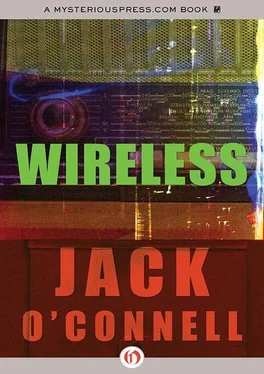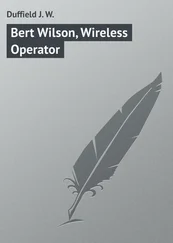Speer tilts his head back on his neck like he was inspecting the ceiling. He whispers, “Son of a bitch was telling the truth,” then moves into the living room.
There are two recessed, built-in bookcases on either side of a brick fireplace. He shines a light on them both, then moves to the right-hand shelf and pulls out a photo album, a big white wedding album. He flips open to the first page, lets out a laugh, throws his arms out to the sides, and says, “Midgets. Fucking midgets,” as if he’d just come to understand a joke he heard yesterday.
He walks in a slow circle around the room, drumming on his leg with the flashlight, mumbling, “I love this. Goddamn wonderful life. Never a dull moment. Tremendous. Midgets.”
It takes a minute to resign himself to this new element in the night. He assures himself nothing has changed but the scenery, that there’s no reason to alter the procedures, that if anything, this will make the interrogation not only easier but possibly humorous and a little refreshing.
He moves into a hall off the living room, follows it to the master bedroom. It’s the same story — miniature bedroom set, low to the ground, little doll-like bureau and dresser. He opens the closets and inspects the clothing. He expects something garish, overly colorful, and it’s a second before he realizes this is from a lifetime of seeing circus dwarfs perform in red satin tuxes and ballooning clown shoes and patchwork checkerboard pants. But all the outfits in the closet are just smaller versions of everyday suits, slacks, shirts, dresses, shoes, and ties. He feels a little let down by this, a little angry, and he pulls the hanger pole from its socket and lets the whole wardrobe fall to the floor.
He goes to the dresser, pulls each drawer out of the unit, and dumps the contents into a pile on the bed. With one hand, he does a lazy sift through underwear and socks and handkerchiefs and some jewelry. He pockets a gold tie clip with an inlaid emerald and moves out to find the basement door.
The cellar is a genuine museum piece, a classic 1960s rec room, all thin, imitation-walnut paneling and red shag carpet, acoustic tile ceiling and recessed yellow-bulb lighting. There’s a pine wet bar at one end of the room with a glossy black Formica top and a half dozen wooden stools with matching black vinyl seat covers. Set up on the bartop is a row of shot glasses decorated with red-ink cartoon figures and little non sequiturs in quotes. Behind the bar, red and green Christmas tree lights trim a set of shelves that rest on gold-plated brackets. Lining the shelves are two rows of tall, bulky trophies, traditional jobs, big engraved wooden bases with silver side columns supporting silver and gold figures mounted on top. The figures, little humans, men and women, are posed in a variety of dance routines — tango, waltz, tap, jazz.
Next to the bar there’s a big, boxy RCA cabinet stereo that must have gone out of production a quarter-century ago. There’s a plaid wool couch and matching easy chairs, a wrought-iron coffee table with glass top, enormous pop-art ashtrays with corners that wing out at a ridiculous length. There’s a small fireplace against another wall and hung over it is a huge framed poster that gives detailed square-dancing instructions. Leaning against the brick of the fireplace is a miniature set of golf clubs in a lime-green bag. There are dusty red Lava Lites, mismatched end tables covered with bright plastic drink coasters, and a line of hanging plastic multicolored beads to wall off the furnace, oil tank, and water main.
But the real eye-catcher in the room, the only thing that might just be of genuine value, is a classic Philco radio. It’s the kind of big, glossy, stand-up model that was so popular just before World War II. Speer walks over to it, stares at it with his hands in his pockets. He remembers his grandmother had a similar radio when he was a child. He guesses it’s now residing up in Manitoba with the rest of the family legacy.
He turns it on, and, though he actually expects it, he’s a little disturbed that the music that fills the room dates from the same time period as the machine itself, a scratchy monorecorded rendition of “Bye, Bye, Blackbird.” Speer starts to whistle along to the tune, then begins a graceful dance of the hips and shoulders, sort of a sweeping, skating move with hands still planted in pockets. He does this until the song ends, then smiles at himself and moves to the bar to fix himself a drink.
The room makes him want a martini, and all the ingredients are available, even a movie-type ribbed-glass shaker with silver cap. He wishes a mambo would come on the radio so he could do the drink justice. He makes a pitcher’s worth of drinks, pours the first one into a glass that reads One more for the road . And then he spots it — one of those personal putting greens, a four-foot strip of foamy green carpet with a brown plastic electric ball- returner waiting at the end. He immediately carries his drink over to the fireplace, places it on the mantel, and grabs a putter and two Spaldings from the golf bag. He drops the balls to the edge of the green and spends a full minute finding the right grip on the putter. He drops into a stance, lines up, draws back slowly, then gives the ball an easy smack. It misses the white circle that signifies a hole, but rolls into the return socket and gets fired back at him with a pleasing, amplified click-sound.
He loves it. Why doesn’t he own one of these mothers? What a wonderful gift this would make. He grabs his glass, takes a quick sip, lines up a second shot, and putts. This time the ball rolls off the green halfway down the carpet and bounces off the baseboard. Speer responds by flinging the mini-club through the air. It crashes into the wall behind the bar, knocks a trophy to the floor. He takes a breath, moves to the bar, finds the club, picks it up, and lets loose on the remaining trophies, taking wild, unaimed cuts, severing gold and silver dancers from their platforms, gouging wood, cracking columns, until finally all the shelves are cleared.
He picks up the martini shaker, moves to the couch, and starts to sit down when professional intuition kicks in. He gets hold of himself, straightens his tie, brushes down the lapels of his suit, and calmly steps over to the fireplace. He crouches down, makes a fist, pauses, then knocks on the brick fire wall.
“Bingo,” he says, and presses with both hands, first one side of the bricks, then the other. The fire wall turns on a hinge and opens a small passage into another room.
Speer gets down on hands and knees and squeezes through with some difficulty. On the other side, he sits on the floor, annoyed with himself for leaving the flashlight behind. He moves a hand into the air, touches a hanging string, and pulls on it. An overhead bulb clicks on.
He’s inside some sort of small vault, maybe five by five by five, windowless. The walls and ceiling are all blueboard. The floor is unfinished plywood. There are two secretary’s typing chairs, swiveled down to their lowest point. He seats himself in one and rolls forward to a homemade, mix-and-match broadcast board. There are transformers, boosters, monitors, an array of microphones and loose speakers, a turntable, cart machines for prerecorded tape loops, and a stack of labeled carts that read applause, wheezing laughter, raspberry, thunder, whistle, lion roar, sneeze, Chinese gong, car crash #1, car crash #2, fire alarm, breaking glass, monsoon, gunshot, balloon pop, foghorn, slamming door, telephone ring, Tarzan yell, typewriter , and bomb drop — whistle & blast . Nailed to the rear wall is a yellowed photo of Harry Houdini.
Speer looks over the board, begins hitting unlabeled toggle switches until the meters light up and then needles swing up into view. He takes an index card and pen from his suitcoat pocket, finds a volume knob, and gingerly turns it to the right. From the speakers comes a sultry female voice saying, “You’ve got to learn to appreciate your inherent carnality.” He points the pen to the frequency indicator, then transcribes a set of numbers onto the card.
Читать дальше












